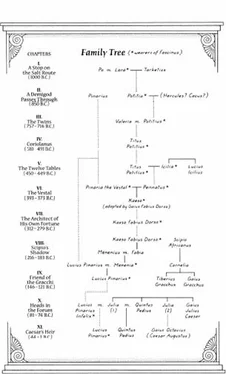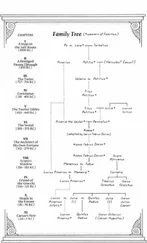Steven Saylor - Roma.The novel of ancient Rome
Здесь есть возможность читать онлайн «Steven Saylor - Roma.The novel of ancient Rome» весь текст электронной книги совершенно бесплатно (целиком полную версию без сокращений). В некоторых случаях можно слушать аудио, скачать через торрент в формате fb2 и присутствует краткое содержание. Жанр: Исторические приключения, на английском языке. Описание произведения, (предисловие) а так же отзывы посетителей доступны на портале библиотеки ЛибКат.
- Название:Roma.The novel of ancient Rome
- Автор:
- Жанр:
- Год:неизвестен
- ISBN:нет данных
- Рейтинг книги:5 / 5. Голосов: 1
-
Избранное:Добавить в избранное
- Отзывы:
-
Ваша оценка:
- 100
- 1
- 2
- 3
- 4
- 5
Roma.The novel of ancient Rome: краткое содержание, описание и аннотация
Предлагаем к чтению аннотацию, описание, краткое содержание или предисловие (зависит от того, что написал сам автор книги «Roma.The novel of ancient Rome»). Если вы не нашли необходимую информацию о книге — напишите в комментариях, мы постараемся отыскать её.
Roma.The novel of ancient Rome — читать онлайн бесплатно полную книгу (весь текст) целиком
Ниже представлен текст книги, разбитый по страницам. Система сохранения места последней прочитанной страницы, позволяет с удобством читать онлайн бесплатно книгу «Roma.The novel of ancient Rome», без необходимости каждый раз заново искать на чём Вы остановились. Поставьте закладку, и сможете в любой момент перейти на страницу, на которой закончили чтение.
Интервал:
Закладка:
Other ancient sources for early Roman history include the biographies of Plutarch, Cicero’s De Republica, the Geography of Strabo, the histories of Dionysius of Halicarnassus, Diodorus Siculus, Cassius Dio, and Polybius, the plays of Plautus, and the Fasti of Ovid, a lesser-known work by the great Latin poet that gives fascinating details about the practice and origin of various Roman customs and religious rites. Our sources for the later Republic include the history of Appian and Suetonius’s biography of Julius Caesar.
Books by modern authors which I found especially stimulating included Augusto Fraschetti’s The Foundation of Rome (Edinburgh University Press, 2005; first published in Italy as Romolo II Fondatore in 2002), T. P. Wiseman’s Remus: A Roman Myth (Cambridge University Press, 1995), Jacques Heurgon’s The Rise of Rome to 264 B.C. (University of California Press, 1973), Nigel Bagnall’s The Punic Wars 264–146 B.C. (Osprey, 2002), and Keith Richardson’s Daggers in the Forum: The Revolutionary Lives and Violent Deaths of the Gracchus Brothers (Cassell, 1976).
I also found inspiration in Thomas Babington Macaulay’s Lays of Ancient Rome, an imaginative nineteenth-century “reconstruction” of ancient Roman ballads, Shakespeare’s tragedy Coriolanus, and Shakespeare’s long narrative poem “The Rape of Lucrece.”
William Smith’s Dictionary of Greek and Roman Antiquities (I own a copy of the 1869 edition, as well as Smith’s three-volume Dictionary of Greek and Roman Biography and Mythology from 1870) and Samuel Ball Platner’s A Topographical Dictionary of Ancient Rome (mine is the 1928 edition) were my daily companions. Both books can be found online, along with many other texts, maps, and additional information, at a Web site called LacusCurtius maintained by Bill Thayer; during the research and writing of Roma, my visits to this extraordinary horn of plenty were too numerous to count. When I needed to borrow a “real” book, I visited the libraries at the University of California at Berkeley.
Readers who want to know the precise location of monuments and landmarks should consult the book Mapping Augustan Rome (Journal of Roman Archaeology Supplementary Series, 2002), largely produced by scholars at the University of Pennsylvania. The large-scale maps that accompany their book are works of prodigious research and exquisite design. For sheer pleasure, readers may want to have a look at the map Roma Arcaica (a publication of the Museo della Civilita Romana available from the American Classical League), a bird’s-eye view of the city as it might have appeared in the early days of the Roman Republic.
This novel has been the largest and most complicated project I’ve ever undertaken, and I’m grateful to those who’ve helped me along the way. The earliest origin of Roma can be traced to Nick Robinson of Constable, my publisher in the U.K., who proposed that I should attempt a novel beyond the scope of my Roma Sub Rosa series; it was at Nick’s flat in London that I first put forth the idea that became this book. It was during a walk along Barton Creek in Austin, Texas, that I further discussed the idea with my editor at St. Martin’s Press, Keith Kahla, who understood at once what I was attempting to do; a few years (and roughly 200,000 words) later, I gratefully received Keith’s insightful comments on the first draft. Krystyna Green, my editor at Constable in the U.K., also played an active role in following the book’s development. I’m also grateful to Gaylan DuBose, teacher of Latin and author of Farrago Latina, who read the galleys and gave me valuable feedback.
Special thanks, as always, to my partner, Rick Solomon, and to my agent, Alan Nevins, both of whom never fail to buoy me up when I need it.
The sometimes uncannily familiar political struggles and partisan machinations in Roma are not my invention, nor have I done much to modernize the terms of the debates. The long tug of war between the patricians and the plebeians, the cynical tactic of the war-mongering ruling class to exploit religious rhetoric and fear of outside threats to their own advantage, the political shift of the descendents of Appius Claudius from far right to far left, the witch-hunt that eradicated the “subversive” Cult of Bacchus, the appeal of the high-born Gracchi to the disenfranchised rabble-each of these incidents is given to us in explicit detail by the sources. The republic of the Romans endured almost twice as long as has our own, so far, and they confronted the paradoxes and paradigms of class struggle long before we did. Whether the American republic will end with the rise of an all-powerful executive, as did that of the Romans, remains to be seen.
Was Fascinus the first deity of the Romans, as recounted in Roma ? According to Pliny’s Natural History (28.7), Fascinus was the name of a god worshipped by the Vestal virgins, who placed his image (a fascinum, or phallus amulet) under the chariot of those who triumphed as a protection against “fascination” (what we would call the evil eye). Varro tells us that phallic amulets were often hung around the necks of Roman children to protect them; they were also placed in gardens and on hearths and forges. Anyone who visits Pompeii will notice phallic graffiti and sculptures, but few may realize that an image that may appear obscene to the modern eye was sacred to the ancients.
The mystical phallus that rises from a hearthfire appears in the origin myth of the Roman king Servius Tullius, and, even earlier, in a variant of the origin story of Romulus as related by the historian Promathion. Early Greek authors like Promathion were the first to speculate on the beginnings of Rome, upon which they tended to superimpose their own myths; eventually the Romans themselves would link the foundation of their city with a Greek legend, the fall of Troy (the subject of The Aeneid by Virgil). “What is extraordinary” about Promathion, as T. P. Wiseman notes in Remus, “is that this early Greek author evidently reported a native Roman story. The phantom phallus is a totally un-Greek concept. Greek gods do not manifest themselves in such a way.”
If Promathion’s depiction of the divine phallus is drawn from an authentic and very early Roman myth, and if this phallus from the hearth is the same deity that later became known as Fascinus, then it may indeed be that Fascinus was the first Roman god. Livy, I suspect, would understand my reasons for making it so.
Интервал:
Закладка:
Похожие книги на «Roma.The novel of ancient Rome»
Представляем Вашему вниманию похожие книги на «Roma.The novel of ancient Rome» списком для выбора. Мы отобрали схожую по названию и смыслу литературу в надежде предоставить читателям больше вариантов отыскать новые, интересные, ещё непрочитанные произведения.
Обсуждение, отзывы о книге «Roma.The novel of ancient Rome» и просто собственные мнения читателей. Оставьте ваши комментарии, напишите, что Вы думаете о произведении, его смысле или главных героях. Укажите что конкретно понравилось, а что нет, и почему Вы так считаете.











